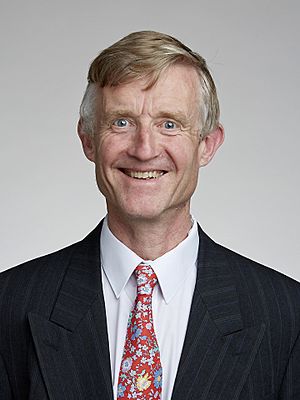Simon Peyton Jones facts for kids
Quick facts for kids
Simon Peyton Jones
|
|
|---|---|

Peyton Jones in 2016
|
|
| Born | 18 January 1958 Simon's Town, Cape Town, South Africa
|
| Citizenship | British |
| Alma mater | University of Cambridge (BSc, Dipl.) |
| Known for | Glasgow Haskell Compiler C-- |
| Awards | ACM Fellow (2004) |
| Scientific career | |
| Fields | |
| Institutions |
|
Simon Peyton Jones is a super smart British computer scientist. He was born on January 18, 1958. He spends his time researching how to make and use special computer languages. He is especially interested in "functional programming" languages. These are a unique way to tell computers what to do.
Contents
Early Life and Education
Simon Peyton Jones went to the University of Cambridge. In 1979, he earned a degree in Electrical Sciences. This field is all about how electricity works and how it can be used in technology.
He was a student at Trinity College, Cambridge during this time. The next year, in 1980, he completed a special diploma in Computer Science. He never got a PhD, but he still became a very important computer expert!
His Amazing Career
Before becoming a professor, Simon Peyton Jones worked in the computer industry for two years. Then, he became a teacher, called a lecturer, at University College London.
From 1990 to 1998, he was a professor at the University of Glasgow. After that, he worked as a researcher at Microsoft Research in Cambridge, England, from 1998 to 2021. Since 2021, he has been an engineering fellow at Epic Games.
Helping Create Programming Languages
Simon Peyton Jones played a big part in designing a computer language called Haskell. He also helped lead the team that built the Glasgow Haskell Compiler (GHC). A compiler is like a translator that turns the code you write into something a computer can understand.
He also helped create another programming language called C--. This language is used as a middle step when computers are translating code. It helps different parts of a computer program talk to each other. C-- is actually used inside the GHC compiler!
In 1999, he also helped write a book called Cybernauts Awake. This book looked at the important ideas about right and wrong, and even spiritual questions, that came up with the internet.
Making Computers Fun for Kids
Simon Peyton Jones is very passionate about teaching computer science in schools. He leads a group called Computing At School (CAS). This group works to make sure kids learn about computer science.
Because of his hard work, he was chosen in 2019 to lead the new UK National Centre for Computing Education. This center helps schools teach computer science better.
Improving Microsoft Excel
Since 2003, Simon Peyton Jones has also helped make Microsoft Excel better. Excel is a popular program used for organizing numbers and data. He wrote a paper about how users could create their own special functions in Excel.
In 2021, some new features were added to the Office 365 version of Excel. These included "anonymous functions" and "let expressions." These features make it easier for people to write complex formulas in Excel.
Awards and Recognition
Simon Peyton Jones has received many important awards for his work.
- In 2004, he became a Fellow of the Association for Computing Machinery. This is a big honor for people who have made important contributions to computer science.
- He became a member of the Academia Europaea (MAE) in 2011.
- Also in 2011, he and Simon Marlow won the SIGPLAN Programming Languages Software Award. They received this for their amazing work on the GHC compiler.
- He has received honorary doctorates from several universities. These include the University of Glasgow (2013), the University of Kent (2017), and the University of Bath (2017). An honorary doctorate is a special degree given to someone who has achieved great things.
- In 2016, he was chosen as a Fellow of the Royal Society (FRS). This is one of the oldest and most respected scientific honors in the world.
- He also became a Distinguished Fellow of the British Computer Society (DFBCS) in 2017.
- In 2016, he received the ACM SIGPLAN Programming Languages Achievement Award.
- In 2022, Simon Peyton Jones was given the title of Officer of the Order of the British Empire (OBE). This award was for his great service to education and computer science.
- He also became a special scholar at Pembroke College Cambridge and an honorary fellow at the University of Cambridge Computer Laboratory.
See also
 In Spanish: Simon Peyton Jones para niños
In Spanish: Simon Peyton Jones para niños
 | Delilah Pierce |
 | Gordon Parks |
 | Augusta Savage |
 | Charles Ethan Porter |

